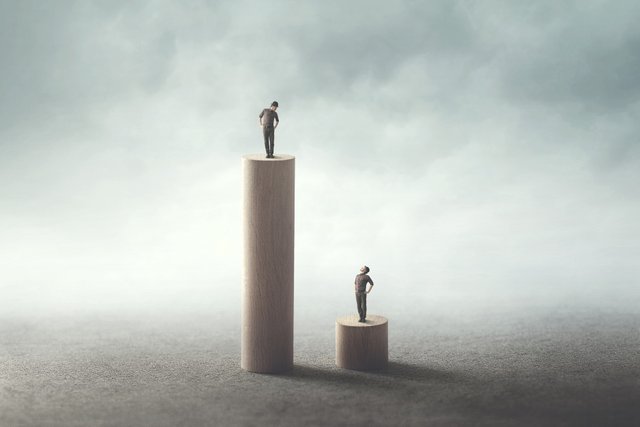It's no coincidence the question you get asked when you first meet someone is 'what do you do?

Competition for status is part of human nature, and this ruthless impulse to polish our image influences the decisions we make to a large extent, the people we befriend, where we live, and, ultimately, the lives that we lead. But at some point you need to wonder: Are you buying that new Audi because you genuinely love the vehicle, the brand, and what it stands for … or are you buying it because your next-door neighbour has a hot, new car and you feel awkward because you have a Maruti?
As a human, we fret, lose sleep, make irrational decisions, behave outside of our boundaries, and squander our attention and energy, all for the singular purpose of wanting to belong, to be seen, or to be viewed as valuable. As Adam Smith said, “Man naturally desires, not only to be loved but to be lovely; or to be that thing which is the natural and proper object of love.” This single statement alone is a distilled reflection from various insightful bodies of knowledge for understanding why we do what we do.
The only remedy that can relieve the pulsating ache of status anxiety is an understanding of why we feel anxious, why we compare and care what others think about us, and how we measure our self-worth. It’s not through the acquisition of more things, although ours is a culture that champions that delusion with a seemingly unwavering conviction.
No one defines this more masterfully and empathetically than Alain de Botton—author and the co-founder of The School of Life—in Status Anxiety. Here’s his explanation:
"A worry, so pernicious as to be capable of ruining extended stretches of our lives, that we are in danger of failing to conform to the ideals of success laid down by our society and that we may, as a result, be stripped of dignity and respect; a worry that we are currently occupying too modest a rung or are about to fall to a lower one.
If our position on the ladder is a matter of such concern, it is because our self-conception is so dependent upon what others make of us. Rare individuals aside (Socrates, Jesus), we rely on signs of respect from the world to feel tolerable to ourselves."

There is never enough reassurance, and the notion that we doggedly seek it out like a thirsty traveller in the Desert is a reflection of our hardwiring. Getting that fancy new car and being noticed, even praised for it, acknowledges our hard work and identity. Although it’s natural to crave acknowledgement and reassurance. It’s not good or bad; it’s simply human. We may justify that the craftsmanship and style of an expensive shoe are worth the purchase, but possibly on a subconscious level, we’re buying it because we know how it’ll reflect towards our friends, strangers, and society at large. It’s not really a shoe that we’re wearing, but rather a cultural story, an icon that represents something, a badge that has its own language. It's no coincidence the question you get asked when you first meet someone is 'what do you do? To ignore this fundamental truth about our nature, or to pretend that we’re immune to such behaviours, is to diminish an element that drives our humanity.
Alain de Botton explains the possible cause of our status anxiety, which connects with the insight from Adam Smith on our desire to not only be loved but to appear lovely. It’s worth taking a look at the opposite side of the coin—why is being ignored so painfully? If you buy a new outfit and no one compliments you on it, was it worth it? According to William James in The Principles of Psychology:
"No more fiendish punishment could be devised, were such a thing physically possible, than that one should be turned loose in society and remain absolutely unnoticed by all the members thereof. If no one turned around when we entered, answered when we spoke, or minded what we did, but if every person we met ‘cut us dead,’ and acted as if we were non-existent things, a kind of rage and impotent despair would before long well up in us, from which the cruellest bodily torture would be a relief.
The attention of others matters to us because we are afflicted by a congenital uncertainty as to our own value, as a result of which affliction we tend to allow others’ appraisals to play a determining role in how we see ourselves. Our sense of identity is held captive by the judgments of those we live among."
That sentence — Our sense of identity is held captive by the judgments of those we live among — is incredibly profound. When I look around the people in our societies, events, universities, everyone has big goals and wonderful ideas, but not everyone acts upon them. Curious as to why, I’ve learned it is rarely about a lack of resources like money or talent and more about the self-confidence, or reassurance, to actually start something that might not work. Like a child that looks back at her mother to make sure it’s safe to play with the other kids, waiting for a warm smile and the nod of her head, we look to the world for reassurance that what we’re doing is right.
Once a human being on the other end shows even a modest sign of belief in that person’s idea or their work, they light up. They feel invigorated, seen, and valued. All of a sudden, that idea seems like it’s worth doing, even if the risk of failure reflects in their mind.
Our measure of self-worth and status is fueled by the extent to which we compare ourselves to other objects of love, success, or status. If we didn’t compare, we wouldn’t feel anxiety, because there’s nothing that’s categorized as better or worse than. But because we’re human, and because we’re wired to be social, a comparison is a natural, ongoing function of the mind, like a clock that ticks.

As long as we belong to a tribe and have people around us, we will feel that gravitational pull to compare, to imagine a future where we have the possessions (or status, or love) we desire.
There really is no other way to alleviate status anxiety other than to deeply understand our social hardwiring, why we compare, and why we falsely believe that acquiring an expensive item is like acquiring traits of a great character. I know many great people who don’t wear a Rolex, and I know many frauds who do. Once you pierce through the halo effect of a lustrous item and have empathy toward and a holistic understanding of human behavior, it’s much easier to be mindful of the things you ruthlessly pursue, and you can begin to see how comparison, competition, and status are ultimately our ways of asking, “Am I loved? Am I seen? Am I valuable?”